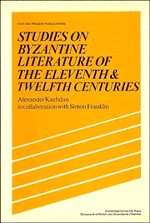Book contents
- Frontmatter
- Contents
- Prooemium
- Acknowledgement
- List of abbreviations
- I Approaches to the history of Byzantine civilization: from Krause to Beck and Mango
- II The social views of Michael Attaleiates
- III Theodore Prodromus: a reappraisal
- IV Eustathius of Thessalonica: the life and opinions of a twelfth-century Byzantine rhetor
- V Gregory Antiochus: writer and bureaucrat
- VI Nicephorus Chrysoberges and Nicholas Mesarites: a comparative study
- VII Nicetas Choniates and others: aspects of the art of literature
- Index
- Past and Present Publications
III - Theodore Prodromus: a reappraisal
Published online by Cambridge University Press: 07 May 2010
- Frontmatter
- Contents
- Prooemium
- Acknowledgement
- List of abbreviations
- I Approaches to the history of Byzantine civilization: from Krause to Beck and Mango
- II The social views of Michael Attaleiates
- III Theodore Prodromus: a reappraisal
- IV Eustathius of Thessalonica: the life and opinions of a twelfth-century Byzantine rhetor
- V Gregory Antiochus: writer and bureaucrat
- VI Nicephorus Chrysoberges and Nicholas Mesarites: a comparative study
- VII Nicetas Choniates and others: aspects of the art of literature
- Index
- Past and Present Publications
Summary
Theodore Prodromus is among the best known of Byzantine poets, and he is certainly one of the most popular with Byzantinists. His life and his works have been scrutinized and elucidated in copious scholarly books and articles. And yet much about him remains obscure or disputed: important aspects of his biography are open to argument; debate continues as to which of the many works attributed to him are genuine, and which are spurious. Consequently, scholars have found it hard to provide any adequate general assessment of the man, his opinions, his qualities as a writer, and his place in the history of Byzantine literature. The aim of the present study is to produce just such a general assessment. As a necessary prelude to this, we start with a survey of the main areas of controversy, first on the question of attribution, and then on the facts of Prodromus' biography. One should state at the outset that the conclusions can only be tentative: Prodromus continues to attract much scholarly attention, and it would be rash to assume that no new and important facts will emerge.
Prodromus' works are normally divided into four groups: (a) those which are indubitably genuine; (b) poems contained in a fourteenth-century manuscript now located in Venice (Marc, XI, 22): (c) the ‘Trodromic’ poems in the vernacular, and (d) certain poems (attributed by their editor to Prodromus' pupil Nicetas Eugenianus) from a manuscript in the Medici library in Florence (Laur. Acquistie doni, 341).
- Type
- Chapter
- Information
- Publisher: Cambridge University PressPrint publication year: 1984
- 4
- Cited by



